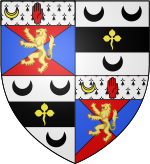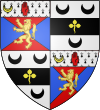Earl of Iveagh
| Earldom of Iveagh | |
|---|---|
  Quarterly, 1st and 4th, Per saltire Gules and Azure a Lion rampant Or on a Chief Ermine a Dexter Hand couped at the wrist of the first, a Crescent for difference (for Guinness); 2nd and 3rd, Argent on a Fess between three Crescents Sable a Trefoil slipped Or (for Lee)[1] | |
| Creation date | 30 September 1919 |
| Creation | First |
| Created by | King George V |
| Peerage | Peerage of the United Kingdom |
| First holder | Edward Guinness, 1st Viscount Iveagh |
| Present holder | Edward Guinness, 4th Earl of Iveagh |
| Heir apparent | Arthur Guinness, Viscount Elveden |
| Remainder to | the 1st Earl's heirs male of the body lawfully begotten |
| Subsidiary titles | Viscount Elveden |
| Status | Extant |
| Seat(s) | Elveden Hall |
| Motto | Spes mea in Deo ("My hope lies in God") |
Earl of Iveagh (pronounced /ˈaɪvi/ EYE-vee—especially in Dublin—or /ˈaɪvɑː/ EYE-vah[2][3]) is a title in the Peerage of the United Kingdom, created in 1919 for the businessman and philanthropist Edward Guinness, 1st Viscount Iveagh.[4] He was the third son of Sir Benjamin Guinness, 1st Baronet, of Ashford, and the great-grandson of Arthur Guinness, the founder of the Guinness brewery.[1]
Guinness had already been created a baronet, of Castle Knock in the County of Dublin, in 1885.[5] He was subsequently made Baron Iveagh, of Iveagh in the County of Down, in 1891,[6] then Viscount Iveagh, of Iveagh in the County of Down, in 1905,[7] and was made Viscount Elveden, of Elveden in the County of Suffolk, at the same time that he was given the earldom in 1919. All titles are in the Peerage of the United Kingdom.[1]
As of 2015, the titles are held by his great-great-grandson, the fourth Earl, who succeeded his father in 1992.
The Conservative politician Walter Guinness, 1st Baron Moyne, was the third son of the first Earl.
The family seat is Elveden Hall, near Elveden, Suffolk, formerly residence of Duleep Singh, the last Maharaja of the Sikh Empire, purchased by the first earl in 1894.[8]
Earls of Iveagh (1919)
| Created by George V | |||||
|---|---|---|---|---|---|
| # | Name | Period | Spouse | Notes | Other titles |
| 1 | Edward Guinness (1847–1927)[1] |
1919–1927 | Adelaide Guinness | Earl of Iveagh (1919) Viscount Iveagh (1905) Baron Iveagh (1891) Baronet of Castle Knock (1895) | |
| 2 | Rupert Guinness (1874–1967)[9] |
1927–1967 | Lady Gwendolen Onslow | Son | Earl of Iveagh and Viscount Elveden (1919) |
| 3 | Benjamin Guinness (1937–1992)[9] |
1967–1992 | Miranda Smiley | Grandson | |
| 4 | Edward Guinness (1969–)[1] |
1992– | Clare Hazell | Son | |
The heir apparent is the current Earl's son, Arthur Guinness, Viscount Elveden.
Arms
  |
|
See also
- Guinness baronets, of Ashford
- Baron Moyne
- Guinness family
- McCartan Chiefs of Kinelarty
Notes
References
- ^ a b c d e Mosley, Charles, ed. (2003). Burke's Peerage, Baronetage & Knighthood (107 ed.). Burke's Peerage & Gentry. p. 2066. ISBN 0-9711966-2-1.
- ^ Arthur Guinness and Dublin's Iveagh legacy. Retrieved 2012-01-11.
- ^ Pronunciation of Surnames, from the book Enquire Within Upon Everything. 119th Edition, March 1939. Retrieved 2012-01-11.
- ^ "No. 31610". The London Gazette. 21 October 1919. p. 12889.
- ^ "No. 25473". The London Gazette. 22 May 1885. p. 2420.
- ^ "No. 26126". The London Gazette. 20 January 1891. p. 360.
- ^ "No. 27865". The London Gazette. 19 December 1905. p. 9084.
- ^ Bryant, Julius (2003). Kenwood, Paintings in the Iveagh Bequest. Yale University Press. p. 370. ISBN 0300102062. Retrieved 2 August 2017.
- ^ a b Mosley 2003, p. 2067
External links
- Cracroft's Peerage online
- Hesilrige, Arthur G. M. (1921). Debrett's Peerage and Titles of courtesy. 160A, Fleet street, London, UK: Dean & Son. p. 506.
{{cite book}}: CS1 maint: location (link)


